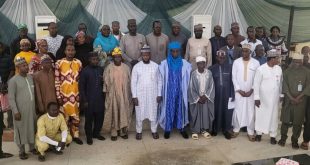The political trajectories of Rt. Hon. Abbas Tajudeen, Speaker of Nigeria’s House of Representatives, and Rt. Hon. Kemi Badenoch, a UK Parliamentarian of Nigerian descent, provide intriguing parallels and lessons in leadership, identity, and representation. While their stories are shaped by different political contexts, they offer insights into the complexities of serving diverse constituencies and the responsibilities of leadership.
Kemi Badenoch: A Lesson in Identity and Responsibility
When Kemi Badenoch emerged as a Parliamentarian in the United Kingdom, Nigerians at home and in the diaspora celebrated her success as a reflection of their global influence. However, the euphoria was short-lived. Badenoch distanced herself from her Nigerian roots, emphasizing her Yoruba identity and stating that she had no obligation to serve as a public relations officer for Nigeria’s challenges. Her stance, though controversial, highlighted a broader debate about identity, loyalty, and the role of leaders in addressing the expectations of their heritage versus their current obligations.
For many Nigerians, Badenoch’s rejection was a painful reminder of the country’s struggles. Yet, her unapologetic assertion of her priorities serves as a call for introspection: leadership requires clarity of purpose, even when it disappoints some stakeholders.
Abbas Tajudeen: A Triumph for Zaria and Kaduna State
In Nigeria, Rt. Hon. Abbas Tajudeen’s rise to prominence mirrors the initial jubilation surrounding Badenoch. Representing Zaria Federal Constituency, Tajudeen’s election as Speaker of the House of Representatives was celebrated across Kaduna State, particularly as it marked a return to national prominence for the region since Architect Namadi Sambo’s tenure as Vice President. Citizens rejoiced, envisioning a leader who would champion the state’s collective development.
Tajudeen’s tenure has yielded tangible dividends, such as securing four new federal tertiary institutions. However, his decision to locate all these institutions in Zaria, an already saturated educational hub, sparked criticism. Critics, including Luka Biniyat of the Middle Belt Forum, argued that as Speaker and a “father figure” to the nation and Kaduna State, Tajudeen should have spread these institutions across the state to foster inclusivity, urbanization, and balanced development.
Leadership Beyond Constituencies
The defense that Tajudeen is primarily a federal lawmaker representing Zaria raises a critical question: where does the duty of a leader to their immediate constituency end and their obligation to a broader community begin? Leadership, particularly at the national level, requires a balance between serving local interests and fostering equitable development. Tajudeen’s focus on Zaria, while understandable, missed an opportunity to address long-standing disparities within Kaduna State, particularly in the Southern Senatorial Zone.
A Call for Statesmanship
To rise above parochialism and leave a lasting legacy, Rt. Hon. Abbas Tajudeen must embrace a broader vision of leadership. One immediate step could be addressing the developmental needs of other parts of Kaduna State, such as Kafanchan, the headquarters of the Southern Senatorial Zone. Establishing a Federal Medical Centre in Zone 3, for instance, would be a transformative project, enhancing healthcare access, spurring urban development, and promoting inclusivity.
Such a gesture would not only demonstrate Tajudeen’s commitment to equitable development but also serve as a strategic political investment, strengthening his reputation as a statesman who transcends regional biases.
Lessons from Badenoch and Tajudeen
Both Kemi Badenoch and Abbas Tajudeen illustrate the complexities of leadership in diverse and often divided societies. Badenoch’s unapologetic prioritization of her immediate obligations, though divisive, underscores the importance of clear priorities in leadership. Tajudeen, on the other hand, highlights the pitfalls of overly localized focus in a role that demands a national perspective.
To truly inspire, leaders must strike a balance between serving their immediate constituencies and addressing the broader needs of their communities. Tajudeen has the opportunity to redefine his legacy by embracing this balance, ensuring that his tenure as Speaker leaves an indelible mark not just on Zaria but on all of Kaduna State and Nigeria.
Conclusion
Leadership is a test of vision, inclusivity, and courage. By learning from both Kemi Badenoch’s clarity and the criticism surrounding his own decisions, Rt. Hon. Abbas Tajudeen can rise to the occasion as a unifying figure. Addressing the developmental disparities within Kaduna State, particularly in underserved areas like Kafanchan, would cement his place as a true statesman and champion of equitable progress. The time for such transformative leadership is now.
Comrade Sanusi Maikudi
Dan Iyan Jema’a
 THESHIELD Garkuwa
THESHIELD Garkuwa




